MercoPress. South Atlantic News Agency
Tag: Central Bank of Brazil
-
Wednesday, March 13th 2019 - 08:12 UTC
Brazil February consumer prices rose 0.43%, and 3.89% in twelve months

Consumer prices in Brazil rose at a slightly faster pace than expected in February due to a rise in private education fees and food and beverage prices, statistics agency IBGE said on Tuesday. On a monthly basis, inflation rose by 0.43% in February, IBGE said, more than the expected 0.39% and up from 0.32% a month earlier.
-
Thursday, December 13th 2018 - 06:57 UTC
Brazilian central bank keeps interest rates at an all time low
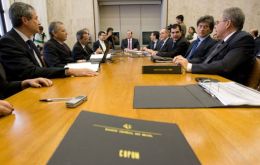
The Brazilian central bank on Wednesday held interest rates at an all-time low, as widely expected, and hinted that it will hold off from raising them for longer than expected. The bank’s nine-member monetary policy committee, Copom, kept the benchmark Selic rate at 6.50 percent for a sixth straight meeting.
-
Wednesday, November 28th 2018 - 18:50 UTC
Brazilian credit card users offered predictable exchange rate for deals in foreign currency
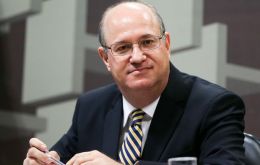
Brazil's Central Bank (BCB) President Ilan Goldfajn Wednesday announced a new rule for credit card charges in foreign currency: the sum consumers will have to pay in reais will be calculated on the basis of the exchange rate at the day of the transaction. The measure, however, will become effective as March 1, 2020.
-
Thursday, November 15th 2018 - 20:49 UTC
Orthodox liberal nominated to Brazil's central bank, Roberto Campos Neto
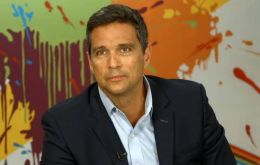
Economist Roberto Campos Neto has accepted an invite to become the head of Brazil's central bank under the government of the incoming president, Jair Bolsonaro, the nation's future economy minister said in a statement on Thursday.
-
Wednesday, November 7th 2018 - 08:55 UTC
Brazilian inflation to peak in second quarter for 2019, forecasts Central bank
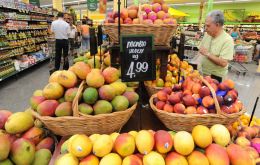
The Brazilian central bank on Tuesday forecast that inflation is likely to peak in the second quarter of 2019 before easing towards its target, adding that underlying inflation was at “appropriate” levels.
-
Thursday, September 20th 2018 - 08:37 UTC
Brazil leaves interest rates unchanged, as long as inflation remains in target range
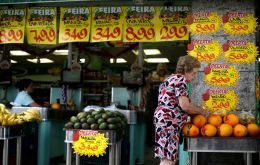
The Brazilian central bank on Wednesday held interest rates at an all-time low despite a currency selloff, as widely anticipated, but said it could “gradually” raise them in the future if inflation expectations spike.
-
Wednesday, September 19th 2018 - 08:18 UTC
Brazilian Bovespa market index up 1.75%; Real suffers a slight depreciation
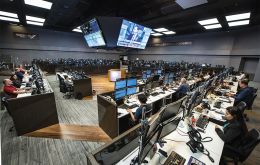
Brazil's benchmark Bovespa index rose 1.75% on Tuesday, rallying for a second straight day largely on a spike in commodities prices. Two of the Bovespa's most heavily weighted equities, miner Vale and oil giant Petrobras benefited from rising commodity prices worldwide amid escalating China-U.S. trade tensions and signals OPEC is not prepared to raise output to address shrinking supplies from Iran.
-
Tuesday, July 17th 2018 - 09:30 UTC
Brazilian market lowers 2018 economic growth to 1.5%, reveals central bank survey
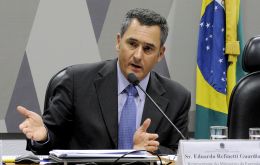
Brazil's financial institutions on Monday reduced the 2018 economic growth forecast to 1.5%, half the initial estimate issued at the beginning of the year, according to the Central Bank weekly survey. The Focus Bulletin, which interviews analysts and economists from Brazil's financial market every Monday, the country's growth estimate was actually reduced from the previous week's 1.53%.
-
Thursday, June 21st 2018 - 08:12 UTC
Brazil leaves Selic benchmark rate unchanged at 6.5%; central bank assessing impact of truckers strike
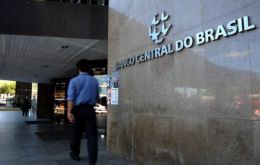
Brazil’s central bank kept interest rates unchanged on Wednesday, as expected, refraining from hiking even after a sharp currency slide as policymakers highlighted the unclear impact of a nationwide protest by truckers in late May.
-
Friday, June 8th 2018 - 08:35 UTC
Temer denies any risk of a currency crisis; Central bank pledges “all the necessary liquidity”
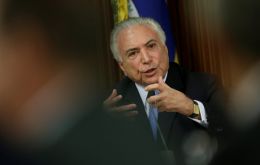
Brazilian President Michel Temer said on Thursday there was no risk of a currency crisis in Latin America's largest economy despite sharp falls in the exchange rate, while the central bank chief pledged to maintain the bank's intervention in the market.
